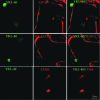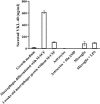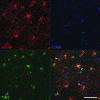YKL-40, a marker of simian immunodeficiency virus encephalitis, modulates the biological activity of basic fibroblast growth factor
- PMID: 18556781
- PMCID: PMC2438291
- DOI: 10.2353/ajpath.2008.080045
YKL-40, a marker of simian immunodeficiency virus encephalitis, modulates the biological activity of basic fibroblast growth factor
Abstract
Human immunodeficiency virus encephalitis causes dementia in acquired immune deficiency syndrome patients. Using proteomic analysis of postmortem cerebrospinal fluid (CSF) and brain tissue from the simian immunodeficiency virus primate model, we demonstrate here a specific increase in YKL-40 that was tightly associated with lentiviral encephalitis. Longitudinal analysis of CSF from simian immunodeficiency virus-infected pigtailed macaques showed an increase in YKL-40 concentration 2 to 8 weeks before death from encephalitis. This increase in YKL-40 correlated with an increase in CSF viral load; it may therefore represent a biomarker for the development of encephalitis. Analysis of banked human CSF from human immunodeficiency virus-infected patients also demonstrated a correlation between YKL-40 concentration and CSF viral load. In vitro studies demonstrated increased YKL-40 expression and secretion by macrophages and microglia but not by neurons or astrocytes. We found that YKL40 displaced extracellular matrix-bound basic fibroblast growth factor (bFGF) as well as inhibited the mitogenic activity of both fibroblast growth factor receptor 1-expressing BaF3 cells and bFGF-induced axonal branching in hippocampal cultures. Taken together, these findings demonstrate that during lentiviral encephalitis, YKL-40 may interfere with the biological activity of bFGF and potentially of other heparin-binding growth factors and chemokines that can affect neuronal function or survival.
Figures












Comment in
-
YKL-40: a candidate biomarker for simian immunodeficiency virus and human immunodeficiency virus encephalitis?Am J Pathol. 2008 Jul;173(1):25-9. doi: 10.2353/ajpath.2008.080389. Am J Pathol. 2008. PMID: 18583323 Free PMC article. Review.
References
-
- Navia BA, Jordan BD, Price RW. The AIDS dementia complex: I. Clinical features. Ann Neurol. 1986;19:517–524. - PubMed
-
- Wiley CA, Achim C. Human immunodeficiency virus encephalitis is the pathological correlate of dementia in acquired immunodeficiency syndrome. Ann Neurol. 1994;36:673–676. - PubMed
-
- Everall I, Luthert P, Lantos P. A review of neuronal damage in human immunodeficiency virus infection: its assessment, possible mechanism and relationship to dementia. J Neuropathol Exp Neurol. 1993;52:561–566. - PubMed
-
- Medina-Flores R, Wang G, Bissel SJ, Murphey-Corb M, Wiley CA. Destruction of extracellular matrix proteoglycans is pervasive in simian retroviral neuroinfection. Neurobiol Dis. 2004;16:604–616. - PubMed
-
- Fusetti F, Pijning T, Kalk KH, Bos E, Dijkstra BW. Crystal structure and carbohydrate-binding properties of the human cartilage glycoprotein-39. J Biol Chem. 2003;278:37753–37760. - PubMed
Publication types
MeSH terms
Substances
Grants and funding
LinkOut - more resources
Full Text Sources
Other Literature Sources

